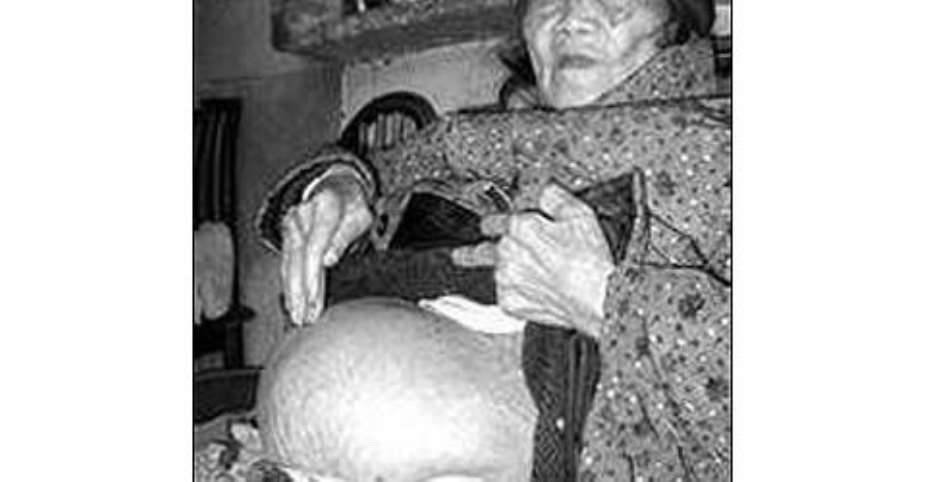The woman was Huang Yijun from China. When she was 31 in 1948, she became pregnant only to find out that she had an ectopic pregnancy, meaning the egg had not attached in the uterus.
In most ectopic pregnancies, the egg will implant in the Fallopian tubes, but in Huang's case, the egg implanted just outside her Fallopian tubes causing what is known as an “abdominal pregnancy”. These are very rare, with only about 1% of all ectopic pregnancies falling into this category (about .0001% of all pregnancies).
In abdominal pregnancies, the embryo often attaches to organs inside the abdomen, and can even attach to such things as a woman's liver, diaphragm, bowels, or spleen.
Surprisingly, an abdominal pregnancy is not necessarily a death sentence for the growing baby, though there are significant risks to the mother and baby and the few such babies who do end up surviving have a 21% chance of having birth defects in part due to lack of amniotic fluid buffer and more compression than the baby would otherwise experience in the uterus.
In Huang's case, the baby did not survive. If the baby dies when it is small enough, the tissues will typically break down and the body will get rid of it naturally. In Huang's case, though, the baby was large enough that her body was unable to get rid of it.
The doctors told her this would be the case and they recommended she get it removed to avoid any potential health problems from it down the line.
Unfortunately, the charge for the surgery (converted to U.S. dollars) would have been about $150 or approximately $1500 today. As Huang said, “It was a huge sum at the time – more than the whole family earned in several years, so I did nothing and ignored it.”
In cases where the baby is too large for the body to get rid of it, instead calcium deposits will build up around the dead tissue, turning the fetus into a “stone baby”, or more technically a “lithopedion”. Women who have this happen are often unaware of it- in known cases of stone babies, the average time-span of carrying the fetus is about 22 years because of this.
The women can often even have other children, despite the presence of the stone baby.Of course, in Huang's case, she was well aware of the presence of the “stone baby”, simply unable to afford to get rid of it. This all changed in 2009 when Huang was 92 years old. At that point, after having carried the fetus for 60 years, she finally had it removed.





 April 20: Cedi sells at GHS13.63 to $1, GHS13.06 on BoG interbank
April 20: Cedi sells at GHS13.63 to $1, GHS13.06 on BoG interbank
 Dumsor: I'm very disappointed in you for messing up the energy sector — Kofi Asa...
Dumsor: I'm very disappointed in you for messing up the energy sector — Kofi Asa...
 Dumsor: Instruct ECG MD to issue timetable and fire him for lying — Kofi Asare t...
Dumsor: Instruct ECG MD to issue timetable and fire him for lying — Kofi Asare t...
 Ashanti region: Road Minister cuts sod for 24km Pakyi No.2 to Antoakrom road con...
Ashanti region: Road Minister cuts sod for 24km Pakyi No.2 to Antoakrom road con...
 Train crash: ‘How could any normal person leave a car on rail tracks?’ — Frankli...
Train crash: ‘How could any normal person leave a car on rail tracks?’ — Frankli...
 Train crash: Driver of abandoned vehicle not our branch chairman nor secretary —...
Train crash: Driver of abandoned vehicle not our branch chairman nor secretary —...
 Kenya pays military homage to army chief killed in copter crash
Kenya pays military homage to army chief killed in copter crash
 US agrees to pull troops from key drone host Niger: officials
US agrees to pull troops from key drone host Niger: officials
 Mahama vows to scrap teacher licensure exams, review Free SHS policy
Mahama vows to scrap teacher licensure exams, review Free SHS policy
 Government will replace burnt Madina shops with a new three-story, 120-store fac...
Government will replace burnt Madina shops with a new three-story, 120-store fac...
